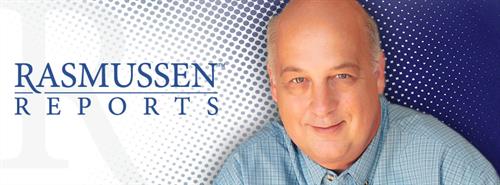
82% of Democrats Say End Shutdown; 71% of GOP Say Keep It Going
Tuesday, October 08, 2013
Just over half of voters think the partial government shutdown will have a negative impact on them personally and want Congress to end the shutdown by authorizing spending for the health care law at existing levels. But most Republicans still would rather continue the shutdown until spending for the law is cut.
The latest Rasmussen Reports national telephone survey finds that just 13% of Likely U.S. Voters say the shutdown has had a major impact on their personal lives so far. Another 38% say they have felt a minor impact from the shutdown. Forty-seven percent (47%) say it has had no impact at all on them. (To see survey question wording, click here.)
Looking ahead, 52% predict that the shutdown will have at least a somewhat negative impact on their lives, including 14% who say it will have a Very Negative one. Only 11% think the shutdown will have a positive impact on them, with three percent (3%) who say Very Positive. One-in-three voters (33%) expects the shutdown to have no personal impact.
The government has been partially shutdown since midnight on September 30. House Republicans authorized funding for continued government operations but left out money for further implementation of the health care law. Senate Democrats refused to approve a budget that does not include money for Obamacare.
Fifty-one percent (51%) of voters would rather have Congress end the shutdown by authorizing spending for the health care law at existing levels. Forty-one percent (41%) would rather continue the shutdown until spending for the law is cut.
Taking a closer look at this question helps put the shutdown impasse in perspective. Eighty-two percent (82%) of Democrats want to end the shutdown by continuing spending for the health care law at current levels. But 71% of GOP voters would rather keep the shutdown going until the law is defunded. Among voters not affiliated with either major party, 47% favor continuing the shutdown, while nearly as many (44%) want to end it.
Just before the shutdown took effect, 46% of all voters wanted a shutdown until spending for the health care law was cut, but that was down from 51% two weeks earlier. Forty-five percent (45%) opposed a shutdown early last week. GOP and unaffiliated support for a shutdown is unchanged from a week ago, but Democratic opposition is up from 68%.
The survey of 1,000 Likely Voters was conducted on October 6-7, 2013 by Rasmussen Reports. The margin of sampling error is +/- 3 percentage points with a 95% level of confidence. Field work for all Rasmussen Reports surveys is conducted by Pulse Opinion Research, LLC. See methodology.
Sixty-nine percent (69%) of all likely voters believe the shutdown will have at least a somewhat negative impact on the overall economy, with 34% who think it will have a Very Negative one. Only 15% see a positive impact from the shutdown, including five percent (5%) who expect a Very Positive impact. Just 12% say there will be no economic impact at all.
Interestingly, even 59% of Republicans think the shutdown will impact the economy negatively, but that compares to 77% of Democrats and 68% of unaffiliated voters who feel that way.
Democrats are only slightly more likely than GOP and unaffiliated voters to say they have already felt an impact from the shutdown and to predict a negative future impact on themselves.
Eighty-seven percent (87%) of voters who say they are part of the Tea Party movement want to keep the shutdown going. Sixty-one percent (61%) of those who are not members of the Tea Party want to end it.
Seventy-one percent (71%) of the Political Class would rather end the shutdown by funding the health care law at existing levels. Fifty-two percent (52%) of Mainstream voters want to keep the shutdown going until spending for the health care law is cut.
But then 51% of those in the Mainstream say the shutdown has had no impact on them at all, compared to 31% of Political Class voters.
Ninety-two percent (92%) of voters nationwide say they have been following recent news reports about the shutdown at least somewhat closely, with 64% who are following Very Closely.
Fifty percent (50%) of Americans say they are paying more for health care than they were last year, but nearly as many (48%) think the private sector, not the federal government, is the way to keep those costs down. Thirty-five percent (35%) have more confidence in the government.
Democrats have lost their lead of the last two weeks and now are running even with Republicans on the Generic Congressional Ballot.
In reacting to current economic problems, most voters (64%) continue to support cutting government spending, while 24% think the government should increase spending.
